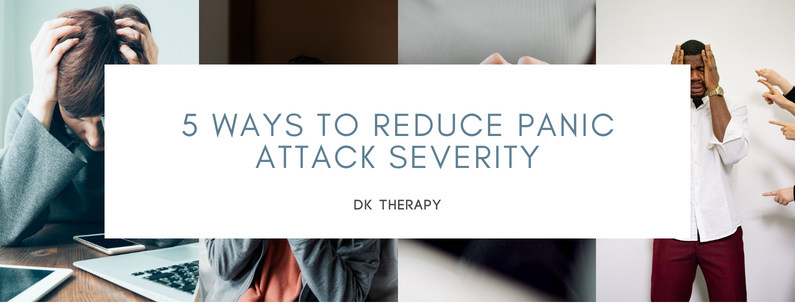
Panic attacks can be debilitating for anyone, and for people with anxiety disorders like General Anxiety Disorder and Panic Disorder, panic attacks are a regular occurrence. A panic attack can feel like the end of the world– but it’s manageable. Here are five ways you can help calm yourself down from a panic attack and reduce its severity:
What is a Panic Attack?
Before we get into solutions, let’s define a panic attack and its symptoms so we can identify them in the future. In psychology, a panic attack is one of your body’s many responses to fear. While this fear could be rational (say, you’ve got to take an important test or you are in a car accident), panic attacks sometimes occur “randomly.” Seemingly random panic attacks are signs that something is causing you stress. To get to the bottom of a mystery stressor, try talking with your doctor or therapist.
Panic Attack Symptoms
During a panic attack, you may feel like you’re losing control, that something bad is about to happen, or that you’re going to die. You’re not going to die, but some of the common panic attack symptoms are quite stressful! Not everyone has the same symptoms when experiencing a panic attack, but the most common are:
- A pounding or racing heartbeat
- Feeling short of breath
- Feeling dizzy, faint, or lightheaded (some people pass out during panic attacks, so sit down if you feel dizzy!)
- Shaking or trembling
- Sweating
- Nausea and occasionally vomiting
- Pain in your chest or abdomen, like your lungs are too big for your body
- Feeling like you’re choking
- Feeling disconnected from reality (this is a type of dissociation)
A panic attack usually lasts between 5 and 20 minutes, but some may last longer. While you can wait out a panic attack, it’s better to try and reduce the symptoms to help you recover after it passes.
Cold Water
 Altering or “TIPPing” your body temperature with cold water is a common technique in Dialectal Behavioral Therapy. The activity essentially shocks your body back into reality and forces you to focus on something different. For people who feel overheated when they have panic attacks, this technique is especially useful!
Altering or “TIPPing” your body temperature with cold water is a common technique in Dialectal Behavioral Therapy. The activity essentially shocks your body back into reality and forces you to focus on something different. For people who feel overheated when they have panic attacks, this technique is especially useful!
For this solution, place a cold washcloth or an ice pack on your forehead, over your eyes, or on the back of your neck. If you’re feeling up to it, you can also hold your breath and dunk your head in a bowl of cold water.
Paced Breathing
Everyone talks about deep breathing to relieve stress, and it does work as long as you know what you’re doing. An effective breathing exercise I like to use with my clients is pretty simple: start by taking a deep breath through your nose, as deeply and gently as possible. When you breathe in, try to keep the inside of your mouth as hollow as possible. Then, breathe out through your mouth until you feel like all the air has left your lungs.
To make sure you’re taking big breaths, count slowly from one to five while you breathe in and out.
Focus on Your Senses
Disconnection from reality is an alarming symptom of panic attacks, but it’s manageable too. Remember: your brain can’t experience all of your available senses at once in a dream, so checking each of your senses can help prove that things are real!
I like to use the countdown method for conducting sensory checks:
- 5 things you see
- 4 things you hear
- 3 things you feel (move around to touch them, if you can!)
- 2 things you smell
- 1 thing you taste
Eat Something
On the topic of tasting, we tend to get anxious when we’re hungry. To help curb some anxiety, have a little something to eat if you feel a panic attack coming on. Focusing on the food in front of you will also keep you from thinking about your panic.
Exercise
Another commonly used method to force yourself out of panic and shift your focus to something else is through exercise. In DBT, we sometimes use intense workouts to reduce panic (it’s part of the TIPP formula), but systematically tensing and relaxing your muscles can also help reduce panic.
If you don’t want to go jogging, try sitting somewhere comfortable or lying on a flat surface and start tensing your toes. Move upwards through your body, holding your muscles as tight as you can for a few seconds, then release them.
A Bonus: Take Your Meds!
Not everyone takes medication for panic attacks, but people who take as-needed medications like Hydroxyzine will benefit from taking their prescribed dosage whenever they feel a panic attack coming on or are in the middle of one. It can be especially difficult to remember tiny things like meds when panicking, but if you have access to your medication, take them!
Looking for some more techniques for handling panic or depression? Give us a call today or book online and schedule an appointment!




